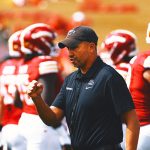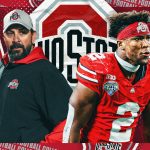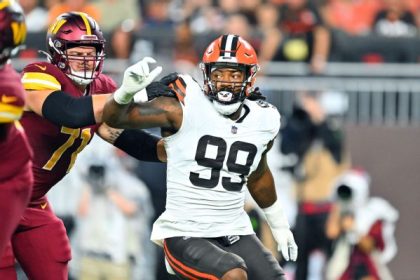
EUGENE, OR. — The temperature is slowly dropping below 50 degrees at Autzen Stadium on a Saturday night in November and a sleeveless Bo Nix is warming up his right arm by lacing 60-yard tosses from the Oregon end zone.
Nix isn’t just playing catch; he’s changing the types of throws every time. Throws off his back foot, throws while rolling to his right, throws while sliding to his left, throws while sauntering up in the pocket, throws while moving back — Nix wants to have all of them dialed in before he takes on USC.
While the practice itself isn’t novel, for Nix, it’s emblematic of his evolution. The 23-year-old has had a college career that started in one decade and is about to end in another. It’s no surprise then that the quarterback he was, at 18 years old, is not the quarterback he now is, at 23.
Maturation has played a role, but so has the work he put in to transform himself into one of the best quarterbacks in the sport, capable of making every throw in the book, not just because of his physical ability but because of his progression from a player who was known for his mistakes as much as his magic, to one who has become an anchor on and off the field for one of the best teams in the country.
“A lot of people think they’re [leaders], but they’re not really self-aware,” Oregon head coach Dan Lanning said of Nix. “There’s probably not a more self-aware person in the world than Bo Nix. And he knows his strengths, he knows his weaknesses, he can identify his thoughts. He’s out there and is able to lead and communicate with other players on our team.”
It’s all led to an impressive final college football season for Nix, who has thrown for 3,135 yards, 29 touchdowns and only two interceptions so far this season. Following a breakout first season in Eugene, Nix has built on his improvements, taking his efficiency to the next level and completing 78% of his passes — a mark that tops the nation — while also recording eight plays of 60 yards or more. His 29-to-2 touchdown-to-interception rate is by far the best of his career.
“I’m just really comfortable right now,” Nix said. “I’m seeing defenses really well and I’m super comfortable with our plan.”
With two games left in the regular season, Nix is a Heisman Trophy contender leading an Oregon team that has conference title aspirations and College Football Playoff hopes. After years of being a quarterback with as many ups as downs, Nix has become not just steady, but elite as well.
“Every day at practice is a Heisman moment to us,” wide receiver Tez Johnson said after Nix’s 412-yard, four-touchdown performance against USC. “We see it every day, so what he did tonight, it was normal.”
“WE LOVE YOU, BO!”
After 60 minutes of handling USC on both sides of the ball, a triumphant Nix jogs off the field to some of the loudest cheers of the night. With pockets of fans calling out his name, Nix looks at home far away from where his college journey began.
There’s a certain ironic improbability to the guy who is from Arkadelphia, Arkansas, and spent most of his life in Alabama ending up finding comfort and success in a place 2,500 miles west. But two seasons in Eugene have now made it clear that the change of scenery was crucial to altering the course and subsequent legacy of Nix’s college career.
At Auburn, where he was from 2019 through 2021, Nix was a bolt of lightning, for better or worse. He burst onto the scene as a freshman with a comeback win over Oregon, of all teams, that immediately vaulted him on a platform. On The Plains, everything he did well, and not so well, over the next three seasons became magnified.
Despite flashes of greatness and wins like the 2019 Iron Bowl, Nix’s completion percentage didn’t cross the 60% mark during his first two seasons. He threw for 16 interceptions and was sacked 40 times over the course of three years. During his last season at Auburn, he was benched for TJ Finley before suffering a season-ending injury. At one point, Nix referred to his one season when Bryan Harsin was coach at Auburn as “miserable.”
It stands to reason that, as Nix was trying to stay afloat at Auburn, he looked to outside counsel — in this case, toward David Morris, a quarterbacks coach and trainer from QB Country, a quarterback development company. Moore remembers watching Nix in high school and being awed by his arm strength. Before working with him in an official capacity, Moore would send Nix feedback and notes following his games at Auburn. Then, going into Nix’s junior season, the two started working together, and the feedback loop as well as the work ramped up.
“Sometimes, they’re mechanical, sometimes they’re more psychological,” Moore said of the notes he would send Nix. “During the season there’s so much on a kid’s plate that you want to be a soundboard, you want to encourage and refocus.”
When Moore started to work more closely with Nix, the formula for success became evident quickly: Nix had all the conventional tools to be an elite quarterback — big arm, quickness and overall physicality — but where the improvement needed to be made was in the very act of refining how to, as Moore put it, “play quarterback.” From his decision-making to his footwork to his ability to make in-game throws, Nix had to make a shift.
In Year 1 of his time with the Ducks, and after two years with Moore, Nix leaped. He completed 72% of his passes, threw for 3,593 yards and completed 29 touchdown passes. Under Lanning and then-offensive coordinator Kenny Dillingham, Nix looked like more of a poised passer than ever, taking Oregon to a 10-3 record and completely revamping the perception of his play.
“He’s gotten good at what matters, check downs and not forced throws downfield,” Moore said. “His feet have gotten so much better because they’re tied to route progressions. He’s rarely too early or real late on a throw.”
Moore can get as granular as you like about how Nix isn’t “ripping” his left arm across anymore, how he’s not as tall and narrow as he once was, or even how his deep ball has improved because he isn’t elevating his front shoulder more than he needs to on such throws. But even he will note that the technical improvements would be evident only if Nix developed as a decision-maker and leader.
“That’s why I think he’s just scratching the surface in a way because he’s grown into an elite quarterback, not just an incredible thrower,” Moore said.
For Nix, the improvement was so radical that one year wasn’t enough. The Ducks didn’t win the Pac-12 or advance to the College Football Playoff last seaso, and Nix still had one more year of eligibility. So, despite having the best season of his college career, Nix not only returned for a final year, he came back better than ever.
NIX CAN’T HELP but smile. The final question of his postgame news conference had set up perfectly for him to say something positive — not about his teammates or his coaches — but about himself. Nix nearly did it but caught himself.
“It’s year five for myself, but I’m still learning different ways to prepare,” Nix said. “And I think I’ve done a good enough job, but obviously I can do better.”
The interview ended, and the local reporter who had asked the question ribbed him: “You almost did it.”
For a player who has familiarized himself plenty with the beats of what it takes to win at the college football level, it’s no surprise that Nix’s confidence, though present, lies just below the surface.
“He’s not the type of guy that wants to get his ego stroked,” Moore said. “In a meeting, he wants to know where can I improve? And I think that honest, self-critique mindset is why he’s gotten better every year.”
As Moore explains, the role getting to Eugene played in Nix’s development is not insignificant. Naturally, the influence of Dillingham and this year’s offensive coordinator, Will Stein, cannot be overstated as Nix has praised the two for how they set up his success with their playcalling. But not being in Auburn, and instead being on the West Coast where the distractions diminished, helped.
“I think sometimes when you get out of your comfort zone, it grows you and it stretches you,” Moore said.
It wasn’t so much that Nix wasn’t meant to play in the SEC as much as it now seems like he belonged in the Pac-12, where quarterback play is the currency that drives some of the nation’s best offenses. Since arriving in Eugene, Nix has transformed. The flash and subsequent erratic play maybe subsided some since those days at Jordan Hare, but in its place something far more valuable has taken hold: efficiency.
“Obviously he’s playing at a really high level,” Lanning said after the victory over USC. “His consistency, I mean, to not punt the ball in the first half speaks to his efficiency. And not all of that was him necessarily throwing the ball. It’s him getting us into the right runs, checking us into proper place, just being efficient with the ball.”
“Efficiency” is the buzz word you hear plenty coming out of Nix’s mouth and Lanning’s and really, every offensive player. After the Cal win this season when Nix completed 29 of his 38 pass attempts and threw for 386 yards and a touchdown, he was focused on something other than how well he had played.
“This is going to sound crazy but those nine incompletions. I’m serious. I really want to go 80% or better.” Nix said.
He has been above 70% in every game this season and has had two games in which he has completed 84% of his passes.
“We can be even be better, so I think that’s the part that keeps you coming back on Monday and making you go back for another week,” Nix said. “The great offenses out there don’t have weaknesses.”
While Nix remains steadfast to the quest, it’s hard to argue that there could be a better finale to his college career than what has transpired this season. Just don’t tell Nix that. He’s still quipping how there are mistakes to clean up, other plays to make, details to perfect, if they want to keep winning. While many, including his teammates and his head coach, are ready to hand him the Heisman, he’s still thinking about how it felt to lose once this season to Washington in the final seconds of the game.
“I am thrilled we won the game, but I just know how it felt a few weeks ago because we didn’t finish the [Washington] game,” Nix said after Oregon’s commanding win over Utah. “I don’t want to have that feeling again.”
Nix is scared and not afraid to admit it. Not scared of defenders rushing at him, of turning the ball over, of losing or even outright failing. In the mind of Nix, complacency — the thought of it arriving at his doorstep or realizing it has been slowly creeping in — is what instills that fear. It’s also what drives him forward and what, after five long years in college football, has brought him here.












